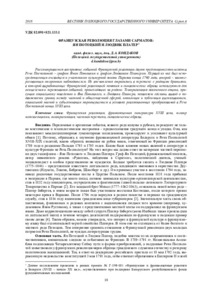Please use this identifier to cite or link to this item:
https://elib.psu.by/handle/123456789/21708Full metadata record
| DC Field | Value | Language |
|---|---|---|
| dc.contributor.author | Кондаков, Д. А. | - |
| dc.date.accessioned | 2018-04-04T13:01:42Z | - |
| dc.date.available | 2018-04-04T13:01:42Z | - |
| dc.date.issued | 2018 | - |
| dc.identifier.citation | Вестник Полоцкого государственного университета. Серия A, Гуманитарные науки. - 2018. - № 2 – C. 18-22. | ru_RU |
| dc.identifier.issn | 2070-1608 | - |
| dc.identifier.uri | https://elib.psu.by/handle/123456789/21708 | - |
| dc.description | French Revolution Through the Eyes of Sarmatians: Jan Potocki and Ludwik Plater D. Kandakou | ru_RU |
| dc.description.abstract | Рассматривается восприятие событий Французской революции двумя представителями шляхты Речи Посполитой – графом Яном Потоцким и графом Людвиком Платером. Первый из них был непосредственным очевидцем и участником культурной жизни Парижа конца 1790 года, второй – заинтересованным сторонним наблюдателем. Их впечатления отразились в переписке с родными братьями, в которой выработанные Французской революцией понятия и символические образы используются для осмысления и переживания событий, происходящих на родине. Театрализация жизненного опыта, присущая социальному поведению и Яна Потоцкого, и Людвика Платера, позволяет сделать вывод о подвижности границ между частной и общественной сферой, интимным и публичным высказыванием, социальной маской и субъективным мироощущением в условиях революционных преобразований в Речи Посполитой конца XVIII века.= The article deals with the reception of the French Revolution events by two nobles from the Polish-Lithuanian Commonwealth: count Jan Potocki and count Ludwik Plater. The former was the direct eye-witness and the participant of the Parisian cultural life late in 1790, while the latter was an interested offside observer. They shared their impressions with their brothers in their private correspondence. Using terms and symbolical images generated by the French Revolution Jan Potocki and Ludwik Plater interpreted and got the feel of the events in their homeland. The theatralisation of life experience was a feature of Jan Potocki and Ludwik Plater’s social behavior. This fact brings to the conclusion that by the end of the 18th century borders between privacy and publicity, personal and public opinion, social mask and subjective attitude were flexible in the public sphere of the Polish-Lithuanian Commonwealth. | ru_RU |
| dc.language.iso | ru | ru_RU |
| dc.publisher | Полоцкий государственный университет | ru_RU |
| dc.relation.ispartof | Веснік Полацкага дзяржаўнага ўніверсітэта. Серыя А, Гуманітарныя навук | be_BE |
| dc.relation.ispartof | Herald of Polotsk State University Series A, Humanity sciences | en_EN |
| dc.relation.ispartof | Вестник Полоцкого государственного университета. Серия A, Гуманитарные науки | ru_RU |
| dc.relation.ispartofseries | Серия A, Гуманитарные науки;2018. - № 2 | - |
| dc.rights | open access | ru_RU |
| dc.subject | Государственный рубрикатор НТИ - ВИНИТИ::ОБЩЕСТВЕННЫЕ НАУКИ::Литература. Литературоведение. Устное народное творчество | ru_RU |
| dc.subject | Французская революция | ru_RU |
| dc.subject | Франкоязычная литература XVIII века | ru_RU |
| dc.subject | Театр неоклассицизма | ru_RU |
| dc.subject | Театрализация | ru_RU |
| dc.subject | Частная переписка | ru_RU |
| dc.subject | Символические образы | ru_RU |
| dc.subject | French revolution | ru_RU |
| dc.subject | 18th century Francophone literature | ru_RU |
| dc.subject | Neoclassical theatre | ru_RU |
| dc.subject | Theatralisation | ru_RU |
| dc.subject | Private correspondence | ru_RU |
| dc.subject | Symbolical images | ru_RU |
| dc.title | Французская революция глазами сарматов: Ян Потоцкий и Людвик Платер | ru_RU |
| dc.type | Article | ru_RU |
| dc.identifier.udc | 82.091+821.133.1 | - |
| Appears in Collections: | 2018, № 2 | |
Items in DSpace are protected by copyright, with all rights reserved, unless otherwise indicated.
